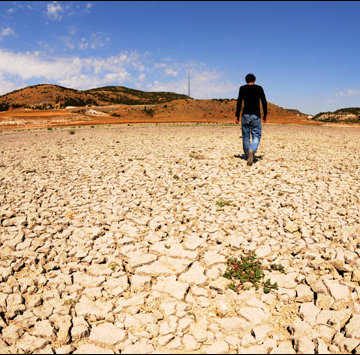- About
- Topics
- Picks
- Audio
- Story
- In-Depth
- Opinion
- News
- Donate
- Signup for our newsletterOur Editors' Best Picks.Send
Read, Debate: Engage.
As a war-stricken country, Afghanistan has been making headlines around the world for years for the relentless loss of lives across the nation. Armed clashes, air and ground offensives, the use of a wide-range of lethal bombs, including the so-called Mother of All Bombs (MOAB), have been tearing the country apart by all warring sides and proxies. Amid all this, a desperate call for measures to mitigate the damage caused to the most vulnerable members of society by depleting natural resources, mainly water, is falling on deaf ears – both internally and in the international arena.
The evident signs of climate change are frightening. The country – heavily dependent on agriculture and natural resources, rain and snow – might further plunge into dilemmas if the Kabul administration and its international backers failed to address the non-military woes of the Himalayan nation.
The United Nations has already warned that this year's extremely dry winter has affected 22 provinces across Afghanistan and now threatens to negatively impact the lives of one million people, with an additional two million who could feel its effects over the coming months. The cautioned impacts on children could be devastating, as these provinces have pre-existing high rates of malnutrition.
After years of heavy international support and military intervention, Afghanistan remains a country where even the capital city is deprived of proper water-supplies and sanitation, let alone far-away provinces where the basic needs of life remain a distant dream for the Afghans.
The population of the relatively safe Kabul has swollen to five million. Heavy drilling for under-ground water has subsequently led to drastic fall in its levels, threatening to diminish it all together in the years to come if measures to re-charge the underground water, streamline the use of water and store rain water are not taken in time. The latest spell of drought has already forced hundreds of families from the remote Badghis province.
As per the UN, among the affected provinces, Bagdhish, Bamyan, Daykundi, Ghor, Helmand, Kandahar, Jawzjan, Nangarhar, Nimroz, Nuristan, Takhar, and Uruzgan are of critical priority for nutrition and water, sanitation and hygiene assistance.
This humanitarian crisis demands measures on war footing to address the fundamental issues, rather than temporary cosmetic attendance of charity, which ultimately leaves the Afghan population without foundations to cater for the nation and with an uncertain future ahead.
